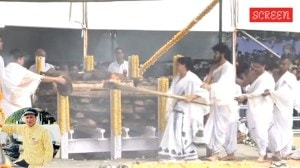Paris-Dakar goes back to its roots
Paris, December 30: This year's Paris-Dakar rally sees the event go back to its roots as a caravan of some 360 cars, motorbikes and trucks...

Paris, December 30: This year’s Paris-Dakar rally sees the event go back to its roots as a caravan of some 360 cars, motorbikes and trucks embark upon an adventure which will see them cover a gruelling 10,739km comprising 6,180 specials.
The race is breaking with recent tradition in that there will be no mass detour of the kind which saw the race finish at the Giza Pyramids in Cairo last year.
Instead, the 23rd edition of the race will open at the Trocadero in the shadow of the Eiffel Tower in Paris on New Year’s day and will finish at Lake Rose in the Senegalese Capital exactly three weeks later after a sweep down France and Spain via La Chatre and the ancient port city of Narbonne.
The racers will then transfer to Morocco before spending a week trekking across Mauritania and Mali before finally reaching Dakar after a gruelling 20-stage effort.
“We thought it was the right time to go back to our roots in the interests of the race,” explained Hubert Auriol, a former winner of the race who has spent the past six years organising the event.
Auriol, who spent yesterday ensuring that final preparations were in place, says he is all about returning to the “fundamental values” of rallying, which will involve mechanics only being drafted in by air at three specific.
The rest of the time they will have to keep up with the racers to lend a technical hand where required.
But the prime aim has to be that the race passes off smoothly without a repeat of last year’s difficulties when threats from Algerian fundamentalist groups forced the cars to be airlifted from Niger to Libya.
The 1999 Paris-Dakar was marred by incidents in Mauritania when rally vehicles were held up not far from Tichitt, in the Mauritanian desert.
Earlier this year the Polisario Front, a separatist group, threatened to disrupt the rally if competitors crossed the western Sahara, a former Spanish colony annexed by Morocco in 1975, which the group claims should be independent.
The Front claims it will resume “ilitary activities and legitimate defence" on January 7, when the rally is due to cross the western Sahara.
Mauritanian Army Commander Brahim Ould Cheibany has already made it plain that race security is a priority.
“All security measures will be assured for competitors in the Paris-Dakar rally while they are crossing mauritanian soil,” insists Cheibany.
The eight stages in Mauritania threaten to sort the wheat from the chaff with the first of them on January 8 the longest stage of all at 619km between Smara and El Ghallaouiya. The stage could hardly present a greater challenge as they negotiate the sandy track flanked by lofty desert dunes in a real survival of the fittest.
Frenchman Jean-Louis Schlesser claimed victory in the auto class last year driving his own converted Renault Buggy and this year returns with a version of the Renault Megane.
Photos



- 01
- 02
- 03
- 04
- 05




























